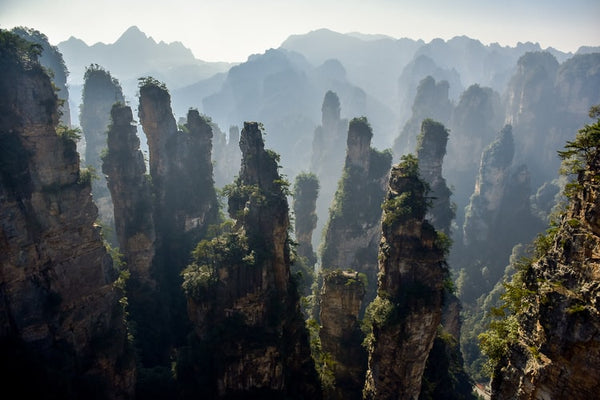Years before tea became a go-to beverage in Europe and North America, Chinese tea merchants created the myth of "Monkey Picked Tea."
At the time, tea for westerners was a wonder. They loved the unusual and exquisite taste. However, tea took quite some time to make the journey from China to Europe and North America. Plus, most people were utterly clueless about how tea was grown and processed.
One myth that did prevail and kept tea drinkers interested and craving more tea was that the tea was picked by brilliant and well-trained monkeys.
The legend particularly referred to Wuyi Mountain tea. The Wuyi Mountains are known for their steep cliffs and hard-to-reach tea bushes that grow at heights up to 1300 meters.
Chinese tea merchants dealing in Wuyi Mountain tea often label their teas "monkey picked" to signify the high altitudes it grows on and its rarity.
The term "Monkey Picked" is still in use today. However, it's primarily a marketing label for high-quality teas, not referring to a specific variety or an actual tea-picking method.

The Legends Of Tea Picked By Monkeys
- One popular legend about "Monkey Picked Tea" originates in Fujian Province, China. It was said that the ancient tea bushes that grow high up on pointy mountain cliffs produce the best tea. Naturally, these tea bushes were almost impossible for tea farmers to reach. Thus the legend tells of tea farmers training pet monkeys to climb the steep cliffs and pick the delicate tea leaves.
- There is a legend of a monk making a pilgrimage together with his pet monkey. The pet monkey would run off the road and into the mountains picking the most delicate tea leaves—a cute story, but most likely without a grain of truth.
- Yet again, a legend with monks and monkeys. Monks who wanted to savor only the best high-mountain oolong tea would purposefully anger the monkeys living on the mountain peaks. This caused the monkeys to rip the branches off the nearby bushes and ragefully throw them at the monks. Kind of sounds like it could be true. But once again, just a marketing ploy.
- Another legend recounts the tale of tea merchants who coined the term 'Monkey Picked Tea' to preserve the rare tea's original processing methods and exceptional taste. Much similar to Duck Shit Oolong!
- And yet another, perhaps more plausible legend. Long ago, tea farmers would tie ropes around their wastes to safely climb up the top peaks of the Wuyi Mountains to harvest the precious tea leaves. The farmers would resemble monkeys, thus the tea's name.
In the late 1700s, a traveler named Aeneas Anderson made a trip to China. There, he met with the tea merchants and was told the story of the enraged monkeys throwing tea leaves from high above — the usual way of harvesting tea for Chinese farmers. While Anderson visited tea plantations and never saw the monkeys himself, he conveyed the story in his book, which Europeans read for many years to follow.
Without prior knowledge of any other tea picking practices (let alone never even seeing a tea bush), Europeans adopted the legend as truth. Furthermore, this version of tea harvest was even published in textbooks and taught to kids in schools for more than a century!
While monkeys can be successfully trained to pick other crops, like coconuts, it is unlikely that they can be trained to pick tea leaves at the standard required by the tea industry.
Tea leaves have very particular plucking standards that change by the season. Furthermore, after harvest, the tea leaves must be handled quickly to avoid the wrong amount of oxidization.
Nowadays, the term "Monkey picked" is mostly used for high-quality oolongs (Tie Guan Yin in particular) that grow at high altitudes.
Are Monkey Picked Oolong teas really picked by monkeys? No, they're not. Are Monkey Picked Oolongs teas actually rare and delicious? Most certainly! But don't just take our word for it — try for yourself!
